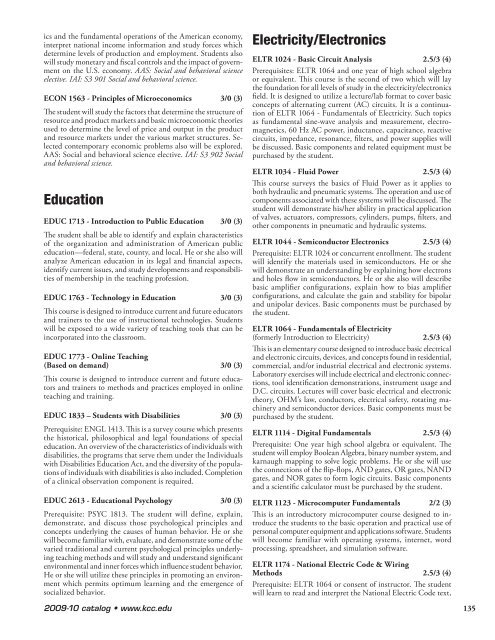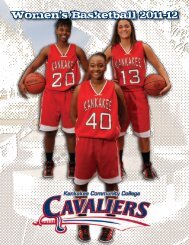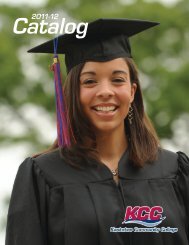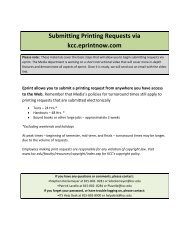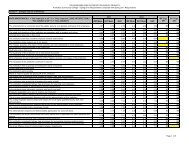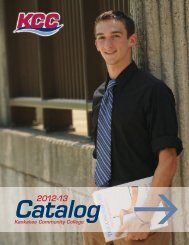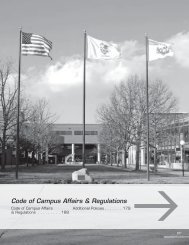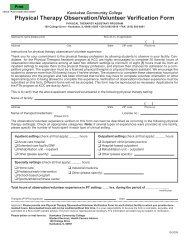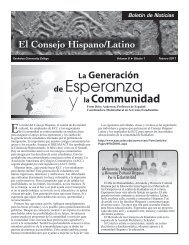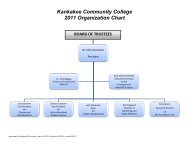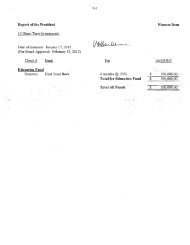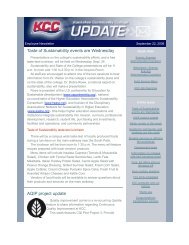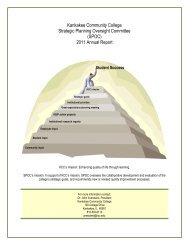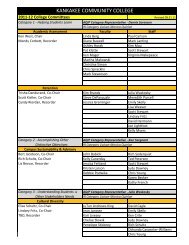09-10_Academiccatalog(Fullcatalog4.30mb) - Kankakee ...
09-10_Academiccatalog(Fullcatalog4.30mb) - Kankakee ...
09-10_Academiccatalog(Fullcatalog4.30mb) - Kankakee ...
You also want an ePaper? Increase the reach of your titles
YUMPU automatically turns print PDFs into web optimized ePapers that Google loves.
ics and the fundamental operations of the American economy,<br />
interpret national income information and study forces which<br />
determine levels of production and employment. Students also<br />
will study monetary and fiscal controls and the impact of government<br />
on the U.S. economy. AAS: Social and behavioral science<br />
elective. IAI: S3 901 Social and behavioral science.<br />
ECON 1563 - Principles of Microeconomics 3/0 (3)<br />
The student will study the factors that determine the structure of<br />
resource and product markets and basic microeconomic theories<br />
used to determine the level of price and output in the product<br />
and resource markets under the various market structures. Selected<br />
contemporary economic problems also will be explored.<br />
AAS: Social and behavioral science elective. IAI: S3 902 Social<br />
and behavioral science.<br />
Education<br />
EDUC 1713 - Introduction to Public Education 3/0 (3)<br />
The student shall be able to identify and explain characteristics<br />
of the organization and administration of American public<br />
education—federal, state, county, and local. He or she also will<br />
analyze American education in its legal and financial aspects,<br />
identify current issues, and study developments and responsibilities<br />
of membership in the teaching profession.<br />
EDUC 1763 - Technology in Education 3/0 (3)<br />
This course is designed to introduce current and future educators<br />
and trainers to the use of instructional technologies. Students<br />
will be exposed to a wide variety of teaching tools that can be<br />
incorporated into the classroom.<br />
EDUC 1773 - Online Teaching<br />
(Based on demand) 3/0 (3)<br />
This course is designed to introduce current and future educators<br />
and trainers to methods and practices employed in online<br />
teaching and training.<br />
EDUC 1833 – Students with Disabilities 3/0 (3)<br />
Prerequisite: ENGL 1413. This is a survey course which presents<br />
the historical, philosophical and legal foundations of special<br />
education. An overview of the characteristics of individuals with<br />
disabilities, the programs that serve them under the Individuals<br />
with Disabilities Education Act, and the diversity of the populations<br />
of individuals with disabilities is also included. Completion<br />
of a clinical observation component is required.<br />
EDUC 2613 - Educational Psychology 3/0 (3)<br />
Prerequisite: PSYC 1813. The student will define, explain,<br />
demonstrate, and discuss those psychological principles and<br />
concepts underlying the causes of human behavior. He or she<br />
will become familiar with, evaluate, and demonstrate some of the<br />
varied traditional and current psychological principles underlying<br />
teaching methods and will study and understand significant<br />
environmental and inner forces which influence student behavior.<br />
He or she will utilize these principles in promoting an environment<br />
which permits optimum learning and the emergence of<br />
socialized behavior.<br />
20<strong>09</strong>-<strong>10</strong> catalog • www.kcc.edu<br />
Electricity/Electronics<br />
ELTR <strong>10</strong>24 - Basic Circuit Analysis 2.5/3 (4)<br />
Prerequisites: ELTR <strong>10</strong>64 and one year of high school algebra<br />
or equivalent. This course is the second of two which will lay<br />
the foundation for all levels of study in the electricity/electronics<br />
field. It is designed to utilize a lecture/lab format to cover basic<br />
concepts of alternating current (AC) circuits. It is a continuation<br />
of ELTR <strong>10</strong>64 - Fundamentals of Electricity. Such topics<br />
as fundamental sine-wave analysis and measurement, electromagnetics,<br />
60 Hz AC power, inductance, capacitance, reactive<br />
circuits, impedance, resonance, filters, and power supplies will<br />
be discussed. Basic components and related equipment must be<br />
purchased by the student.<br />
ELTR <strong>10</strong>34 - Fluid Power 2.5/3 (4)<br />
This course surveys the basics of Fluid Power as it applies to<br />
both hydraulic and pneumatic systems. The operation and use of<br />
components associated with these systems will be discussed. The<br />
student will demonstrate his/her ability in practical application<br />
of valves, actuators, compressors, cylinders, pumps, filters, and<br />
other components in pneumatic and hydraulic systems.<br />
ELTR <strong>10</strong>44 - Semiconductor Electronics 2.5/3 (4)<br />
Prerequisite: ELTR <strong>10</strong>24 or concurrent enrollment. The student<br />
will identify the materials used in semiconductors. He or she<br />
will demonstrate an understanding by explaining how electrons<br />
and holes flow in semiconductors. He or she also will describe<br />
basic amplifier configurations, explain how to bias amplifier<br />
configurations, and calculate the gain and stability for bipolar<br />
and unipolar devices. Basic components must be purchased by<br />
the student.<br />
ELTR <strong>10</strong>64 - Fundamentals of Electricity<br />
(formerly Introduction to Electricity) 2.5/3 (4)<br />
This is an elementary course designed to introduce basic electrical<br />
and electronic circuits, devices, and concepts found in residential,<br />
commercial, and/or industrial electrical and electronic systems.<br />
Laboratory exercises will include electrical and electronic connections,<br />
tool identification demonstrations, instrument usage and<br />
D.C. circuits. Lectures will cover basic electrical and electronic<br />
theory, OHM’s law, conductors, electrical safety, rotating machinery<br />
and semiconductor devices. Basic components must be<br />
purchased by the student.<br />
ELTR 1114 - Digital Fundamentals 2.5/3 (4)<br />
Prerequisite: One year high school algebra or equivalent. The<br />
student will employ Boolean Algebra, binary number system, and<br />
karnaugh mapping to solve logic problems. He or she will use<br />
the connections of the flip-flops, AND gates, OR gates, NAND<br />
gates, and NOR gates to form logic circuits. Basic components<br />
and a scientific calculator must be purchased by the student.<br />
ELTR 1123 - Microcomputer Fundamentals 2/2 (3)<br />
This is an introductory microcomputer course designed to introduce<br />
the students to the basic operation and practical use of<br />
personal computer equipment and applications software. Students<br />
will become familiar with operating systems, internet, word<br />
processing, spreadsheet, and simulation software.<br />
ELTR 1174 - National Electric Code & Wiring<br />
Methods 2.5/3 (4)<br />
Prerequisite: ELTR <strong>10</strong>64 or consent of instructor. The student<br />
will learn to read and interpret the National Electric Code text,<br />
135


